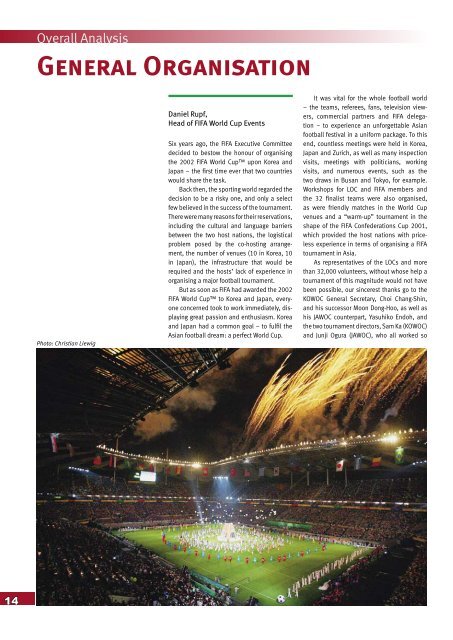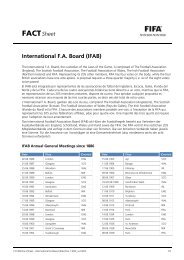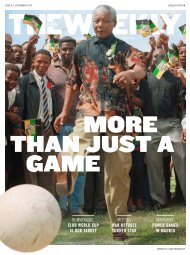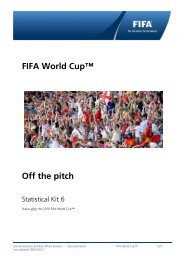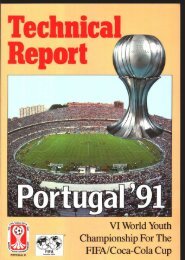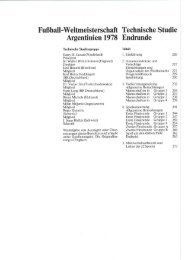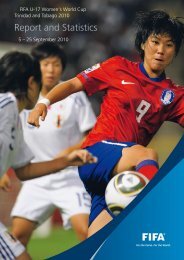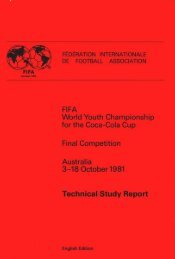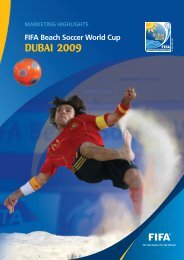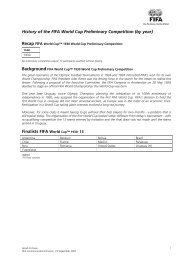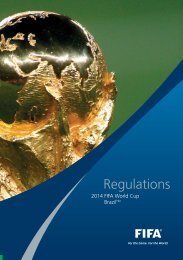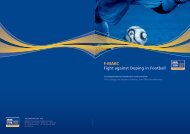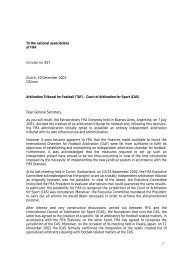You also want an ePaper? Increase the reach of your titles
YUMPU automatically turns print PDFs into web optimized ePapers that Google loves.
14<br />
<strong>Overall</strong> <strong>Analysis</strong><br />
General Organisation It<br />
Photo: Christian Liewig<br />
Daniel Rupf,<br />
Head of <strong>FIFA</strong> World Cup Events<br />
Six years ago, the <strong>FIFA</strong> Executive Committee<br />
decided to bestow the honour of organising<br />
the 2002 <strong>FIFA</strong> World Cup upon Korea and<br />
Japan – the first time ever that two countries<br />
would share the task.<br />
Back then, the sporting world regarded the<br />
decision to be a risky one, and only a select<br />
few believed in the success of the tournament.<br />
There were many reasons for their reservations,<br />
including the cultural and language barriers<br />
between the two host nations, the logistical<br />
problem posed by the co-hosting arrangement,<br />
the number of venues (10 in Korea, 10<br />
in Japan), the infrastructure that would be<br />
required and the hosts’ lack of experience in<br />
organising a major football tournament.<br />
But as soon as <strong>FIFA</strong> had awarded the 2002<br />
<strong>FIFA</strong> World Cup to Korea and Japan, everyone<br />
concerned took to work immediately, displaying<br />
great passion and enthusiasm. Korea<br />
and Japan had a <strong>com</strong>mon goal – to fulfil the<br />
Asian football dream: a perfect World Cup.<br />
was vital for the whole football world<br />
– the teams, referees, fans, television viewers,<br />
<strong>com</strong>mercial partners and <strong>FIFA</strong> delegation<br />
– to experience an unforgettable Asian<br />
football festival in a uniform package. To this<br />
end, countless meetings were held in Korea,<br />
Japan and Zurich, as well as many inspection<br />
visits, meetings with politicians, working<br />
visits, and numerous events, such as the<br />
two draws in Busan and Tokyo, for example.<br />
Workshops for LOC and <strong>FIFA</strong> members and<br />
the 32 finalist teams were also organised,<br />
as were friendly matches in the World Cup<br />
venues and a “warm-up” tournament in the<br />
shape of the <strong>FIFA</strong> Confederations Cup 2001,<br />
which provided the host nations with priceless<br />
experience in terms of organising a <strong>FIFA</strong><br />
tournament in Asia.<br />
As representatives of the LOCs and more<br />
than 32,000 volunteers, without whose help a<br />
tournament of this magnitude would not have<br />
been possible, our sincerest thanks go to the<br />
KOWOC General Secretary, Choi Chang-Shin,<br />
and his successor Moon Dong-Hoo, as well as<br />
his JAWOC counterpart, Yasuhiko Endoh, and<br />
the two tournament directors, Sam Ka (KOWOC)<br />
and Junji Ogura (JAWOC), who all worked so


